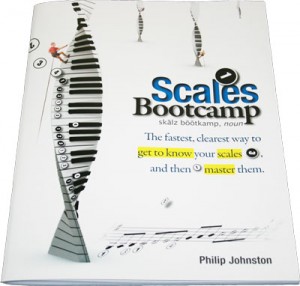OK, so I know that “fun” might be the wrong word to ever describe scales, but there are some great resources available to help make scale practice infinitely more interesting.
As much as it can sometimes be tempting to throw scale practice out for good and just get on with music-making for both ourselves and our students (especially for those of us trying to teach everything in 30 mins!), there will forever be a requirement for scales in music examinations and auditions and therefore a need for us to teach scale technique effectively and concisely.
I have previously described in my post Are Scales Irrelevant? how I like students to play scales in rhythms in order to ensure they stay engaged and to make the learning process both more challenging and interesting. I’ve also discussed non-scale technical work ideas in my post about Holiday Tech Work.

The challenges include things that I already use such as playing hands separately and together, 2 octaves, 4 octaves, eyes shut, faster, slower, etc. but also includes a huge number of new ideas that I hadn’t thought of, such as:
The book then has countless pages of “twists” which are technical challenges designed to make playing even more difficult and ensure the student never switches into ‘autopilot’. The twists are divided into:
Best of all, the student can track their own progress through all the of the twists and challenges with a check box on each scale page. Johnston’s mantra throughout the book is that if you can complete all the challenges and twists for a scale (and there are LOTS of them!), you’ll never forget a scale again; having tried all of the different ways of playing presented in the book, I’m inclined to believe him!
Next is Mike Springer’s “Not Just Another Scale Book”. There are actually 3 books in this series, but I tend to use Book 1 most with my students:
 look inside  |
Not Just Another Scale Book, Book 1 (10 Innovative Piano Solos Using Major and Minor Scales). By Mike Springer. For Piano. Piano Collection; Piano Supplemental; Technique Musicianship. Not Just Another. Intermediate. Book & CD. Published by Alfred Music Publishing (AP.25905)  (2) …more info |
What Mike has done is write some very cool pieces based on scales in each of the keys…a little bit like a modern-day Well-Tempered Clavier! Best of all, the book comes with a great backing CD that is very well-produced compared to many on the market.
I particularly like “Boogie Woogie Rock” which is the C major scale piece, and the first in this book. It’s fun, fast, includes lots of C major practice with added glissandi and great rhythms all in a boogie style. All my kids love it! Click the link above to see example pages on sheetmusicplus.
Finally, check out a book called “Piano Fitness” from Hal Leonard:
 |
Piano Fitness (A Complete Workout). Keyboard Instruction. Softcover with CD. 144 pages. Published by Hal Leonard (HL.311995)…more info |
This is a great book for intermediate and advanced students that tackles scales and arpeggios from more of a jazz background. It works around the circle of 5ths and very quickly includes 7ths, pentatonic, blues scales, chords and chord voicings and comes with backing tracks in a whole variety of styles to play along with. Great to add to your students’ repertoire and a good way to keep things interesting.

Daniel says:
Hi Tim,
Where did you buy the Scales Bootcamp book. I can’t seem to find where I can buy it online.
Thanks.
Tim Topham says:
Hi Daniel – just click the links or book image above 🙂
Anna Mathews Fagan says:
A little tech help to make scales fun — the Scale Blitzer app! https://itunes.apple.com/au/app/scaleblitzer/id550869343?mt=8
Tim Topham says:
I can’t believe I forgot about that, Anna. Thanks for the reminder!! I actually talked about it in this article: http://fpsresources.com/2014/04/08/tech-tuesday-the-real-reason-teens-are-quitting-your-studio-part-3-technology/ but should definitely add it now 🙂
The Dynamic Studio – brilliant new book from Philip Johnston | Tim Topham says:
[…] How to make piano scales fun! […]
Ryan Record says:
Thanks for the post. I am a piano teacher and God knows I need some help making scales fun.
christinabarrie says:
Thanks so much for posting this, Tim – the ‘Not just another scale book’ is a real hit, especially the Boogie Woogie Rock!
timtopham says:
Thanks Christina – great to hear you’re also a fan 🙂